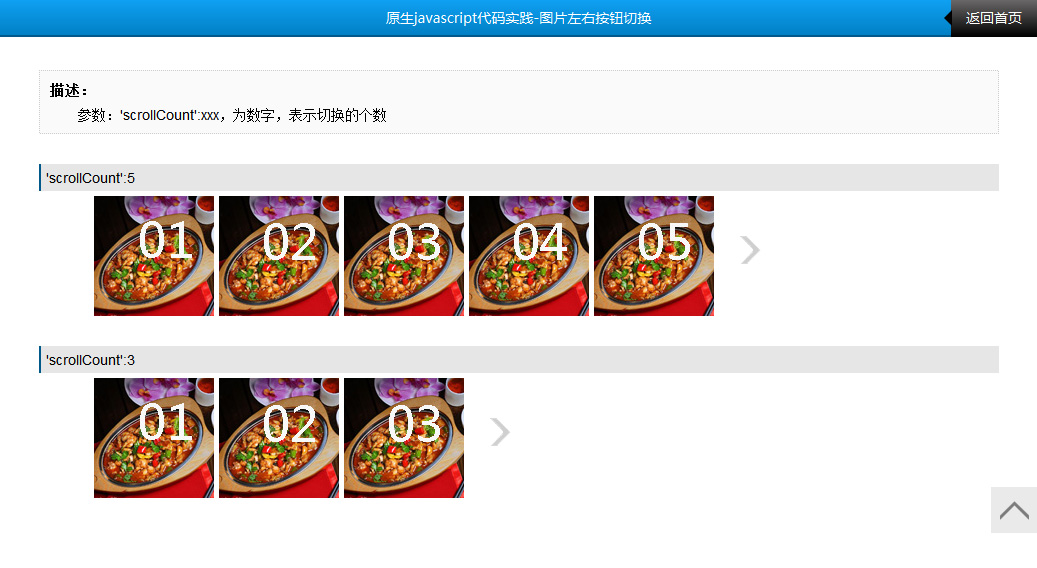先給大家看下效果展示圖

以下為詳細代碼:
復制代碼 代碼如下:
function LGY_picSwitch(option){
this.oWrap = this.getId(option.wrapID); //最外層元素
this.olistWrap = this.getNodeByClassname(this.oWrap,'gy_picSwitch_listWrap')[0];
this.oUl = this.olistWrap.getElementsByTagName('ul')[0];
this.oBtnPrev = this.getNodeByClassname(this.oWrap,'gy_picSwitch_prev')[0];
this.oBtnNext = this.getNodeByClassname(this.oWrap,'gy_picSwitch_next')[0];
this.nLen = this.oUl.getElementsByTagName('li').length; //圖片總數
this.nScollCount = option.scrollCount; //每次滾動的數量
this.nScollLen = Math.ceil(this.nLen/option.scrollCount); // 切換判斷的最大值
this.nSwitchWidth = 0; //每次切換移動的距離,在代碼裡面動態獲取值
this.nIndex = 0; //切換圖片的當前索引
this.timer = null; //切換圖片的引值
this.int();
}
LGY_picSwitch.prototype = {
getId:function(id){
return document.getElementById(id);
},
getNodeByClassname:function(parent,classname){
var classElements = new Array();
var els = parent.getElementsByTagName('*');
var elsLen = els.length;
var pattern = new RegExp("(^|\\s)"+classname+"(\\s|$)");
for (i = 0, j = 0; i < elsLen; i++) {
if ( pattern.test(els[i].className) ) {
classElements[j] = els[i];
j++;
}
}
return classElements;
},
getCss:function(node,value)
{
return node.currentStyle?node.currentStyle[value]:getComputedStyle(node,null)[value];
},
setCss:function(node,val){
for(var v in val){
node.style.cssText += ';'+ v +':'+val[v];
}
},
moveFn:function(node,value,targetValue,callback){
var _that = this;
clearInterval(this.timer);
this.timer = setInterval(function()
{
var val = parseFloat(_that.getCss(node,value));
var speed = ( targetValue- val )/8;
speed = speed>0?Math.ceil(speed):Math.floor(speed);
if(speed ==0)
{
clearInterval(_that.timer);
callback&&callback();
}
else
{
node.style[value] = ( val + speed ) +'px';
}
},20);
},
picChange:function(){
this.moveFn(this.oUl,'marginLeft',-this.nIndex*this.nSwitchWidth);
},
cancelBubble:function(e){
e.stopPropagation?e.stopPropagation():e.cancelBubble = true;
},
btnIsShow:function(){
this.setCss(this.oBtnNext,{'display':'block'});
this.setCss(this.oBtnPrev,{'display':'block'});
if( this.nIndex == 0 ) this.setCss(this.oBtnPrev,{'display':'none'});
if( this.nIndex ==(this.nScollLen-1) ) this.setCss(this.oBtnNext,{'display':'none'});
},
btnPrev:function(){
var _that = this;
this.oBtnPrev.onclick = function(e){
var e = e || window.event;
_that.cancelBubble(e);
if(_that.nIndex != 0 ) {
_that.nIndex--;
_that.picChange();
_that.btnIsShow();
}
}
},
btnNext:function(){
var _that = this;
this.oBtnNext.onclick = function(e){
var e = e || window.event;
_that.cancelBubble(e);
if(_that.nIndex != (_that.nScollLen-1) ) {
_that.nIndex++;
_that.picChange();
_that.btnIsShow();
}
}
},
int:function(){
//動態獲取移動的寬度
var oLi = this.oUl.getElementsByTagName('li')[0],
oLi_w = oLi.offsetWidth + parseInt(this.getCss(oLi,'marginLeft')) + parseInt(this.getCss(oLi,'marginRight'));
this.nSwitchWidth = oLi_w*this.nScollCount;
//按鈕顯示初始化
this.btnIsShow();
//左右切換
this.btnPrev();
this.btnNext();
}
}
HTML代碼:
復制代碼 代碼如下:
/*
* HTML結構必需是以下:外層ID名,自己傳入 如下面的:id="gy_picSwitch02" ,ID名,自己隨便給
但,裡面的結構必需一樣,包括類名classname
<div id="gy_picSwitch02">
<span class="gy_picSwitch_prev"></span>
<span class="gy_picSwitch_next"></span>
<div class="gy_picSwitch_listWrap">
<ul>
<li><img src="images/pic01.jpg" alt=""></li>
<li><img src="images/pic02.jpg" alt=""></li>
<li><img src="images/pic03.jpg" alt=""></li>
<li><img src="images/pic04.jpg" alt=""></li>
<li><img src="images/pic05.jpg" alt=""></li>
<li><img src="images/pic06.jpg" alt=""></li>
<li><img src="images/pic07.jpg" alt=""></li>
<li><img src="images/pic08.jpg" alt=""></li>
</ul>
</div>
</div>
參數:'wrapID':'xxxx',最外層的ID名
'scrollCount':5,滾動的數量
復制代碼 代碼如下:
*
*/
//實例化
new LGY_picSwitch({'wrapID':'gy_picSwitch','scrollCount':5});
是不是很方便的功能呢,使用也很簡單,這裡推薦給小伙伴,希望對大家能有所幫助